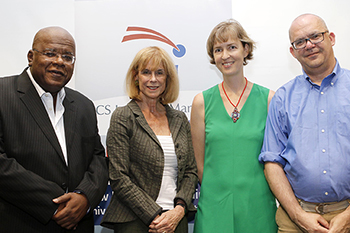Latest News Archive
Please select Category, Year, and then Month to display items
09 December 2020
|
Story UFS entral academic advising team
|
Photo Pixabay

It wasn’t easy, but we all got to this point because we stayed calm and made the effort to learn on even when it was difficult.
The University of the Free State (UFS) has remained committed to supporting you in every way possible, and as you prepare for the final assessments, remember to access the support tools you will need in order to successfully complete the 2020 academic year: https://www.ufs.ac.za/toolsforsuccess
Main exams are running from 30 November to 19 December 2020
All of the best, and break a pen in your upcoming final assessments. For those of you who will be graduating, we cannot wait to see you in that graduation attire; and those who still have some way to go, we cannot wait to serve you again in 2021 as we continue the pursuit of academic success!
Below are five main study tips that you can use for final assessment success:
1. Set a realistic study schedule
You might think that studying for eight hours straight for four days before the exam, will help you get through the work in time. See final edition of the #UFSLearnOn for more information.
2. Structure and organise your work
If your notes are organised, it is also easier for your brain to recall information, even when you become nervous during exams.
3. Practise with an old exam/semester test paper
Practice makes perfect, and although the final assessments might look different in how they are administered, it will still help to practise using old tests and exams.
4. Adapt your strategies to the content
What works for one module or even one learning outcome, might not be effective for another. You need to continually adapt your note-taking and study approaches. See #UFSLearnOn final edition for different study methods.
5. Healthy body, healthy mind
Your brain needs optimal care to perform at its best, and getting physically active (even if it is by jumping in one spot if space is limited) forces your body to release neurotransmitters responsible for positive emotions, which assist in retaining information in your memory …
Download the final edition of #UFSLearnOn that points you towards the resources you’ll need to ace your final assessments and end 2020 off on a high note!
UFS hosts first ACS Institute held on African soil
2015-12-08

The first ever Association for Cultural Studies (ACS) Institute hosted on the African continent is taking place on the Bloemfontein Campus. At the event are, from the left: Prof Jonathan Jansen, Vice-Chancellor and Rector of the UFS; Prof Jean Comaroff, Alfred North Whitehead Professor of African and African-American Studies and Anthropology at Harvard University; Prof Helene Strauss, Chair of the Department of English at the UFS; and Prof Gil Rodman, Chair of the Association for Cultural Studies and Professor of Communication Studies at the University of Minnesota.
Photo: Johan Roux
|
The University of the Free State (UFS) is hosting the 2015 conference of the Association for Cultural Studies (ACS) Institute – the first time for this international event to take place on the African continent.
From 7 – 12 December 2015, some of the world’s leading scholars in cultural studies are taking part in the conference on the Bloemfontein Campus. The event has been organised by the UFS Department of English in collaboration with colleagues from other departments in the Faculty of the Humanities.
The ACS is the foremost international association for scholars in cultural studies, and has been hosting the biennial Crossroads in Cultural Studies Conference since 2006. In 2011, the ACS held its inaugural institute at the University of Ghent (Belgium), followed, in 2013, by one at the Alpen-Adria University Klagenfurt (Austria). As the 2015 meeting of the institute is the first to be held in Africa, the organisers aim at highlighting the contributions that scholars from our continent and other (post)colonial contexts have made to cultural studies, even as it engaged many of the long-standing theoretical concerns generated for the field by scholars from the Global North.
Themed ‘Precarious Futures’, the conference explores how cultural studies might assist in charting more equitable futures by reflecting critically on the cultural, economic, and political trajectories within which precariousness – a state increasingly anticipated for the planet – might be altered. Experts in a diversity of disciplines are sharing their perspectives in the form of seminars and lectures.
Keynote lectures are delivered by Prof Jean Comaroff (Harvard University), Prof John Erni (Hong Kong Baptist University), Dr Jo Littler (City University London), Dr Zethu Matebeni (University of Cape Town), and Prof Handel Kashope Wright (University of British Columbia).
In her opening lecture on Monday 7 December 2015, Prof Comaroff addressed the challenging relationship of law, detection, and sovereignty in contemporary African polities within the South African post-apartheid context.
Topics discussed include climate change; the archives of everyday life; cross-racial intimacies; ethnography; meritocracy; cultural studies and human rights; China and globalisation; gender, sexuality, and race; and governance, embodiment and the work of care.